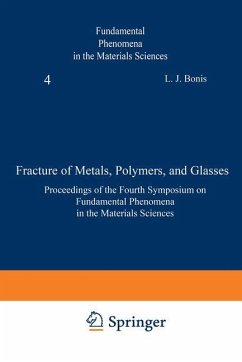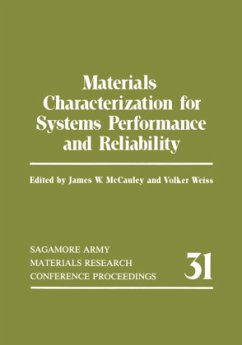
Fracture of Metals, Polymers, and Glasses
Proceedings of the Fourth Symposium on Fundamental Phenomena in the Materials Sciences
Herausgegeben von Bonis, L.

PAYBACK Punkte
39 °P sammeln!
Elucidation of the various mechanisms responsible for fracture in different materials was the general subject of the Fourth Annual Symposium on Fundamental Phenomena in the Materials Sciences held January 31 and February 1, 1966, in Boston and sponsored by the Ilikon Corporation of Natick, Massachusetts. In an analysis of the brittle-to-ductile transition in polycrystalline metals, T. L. Johnston (Ford Motor Company) placed major emphasis on factors related to the plastic resistance associated with grain boundaries and the effects of plastic anisotropy. Utilizing a generalized form of the Grif...
Elucidation of the various mechanisms responsible for fracture in different materials was the general subject of the Fourth Annual Symposium on Fundamental Phenomena in the Materials Sciences held January 31 and February 1, 1966, in Boston and sponsored by the Ilikon Corporation of Natick, Massachusetts. In an analysis of the brittle-to-ductile transition in polycrystalline metals, T. L. Johnston (Ford Motor Company) placed major emphasis on factors related to the plastic resistance associated with grain boundaries and the effects of plastic anisotropy. Utilizing a generalized form of the Griffith criterion, he said it can be readily shown that several individual factors may be made reasonably quantitative and that the nature of plastic response can be predicted. Specifically, it can be shown that a critical factor relates to the length of a plastic shear zone which is constrained by an elastically loaded matrix. As this length increases, the Griffith inequality is satisfied and brittle failure occurs; however, the use of decreased grain sizes or the refine ment of dislocation or twin distribution can further tend to "homoge nize" the plastic flow and to decrease the magnitude of the shear zone. Of considerable importance in the consideration of plastic resistance is the availability of favorably oriented slip systems in aa un sheared crystallite.














